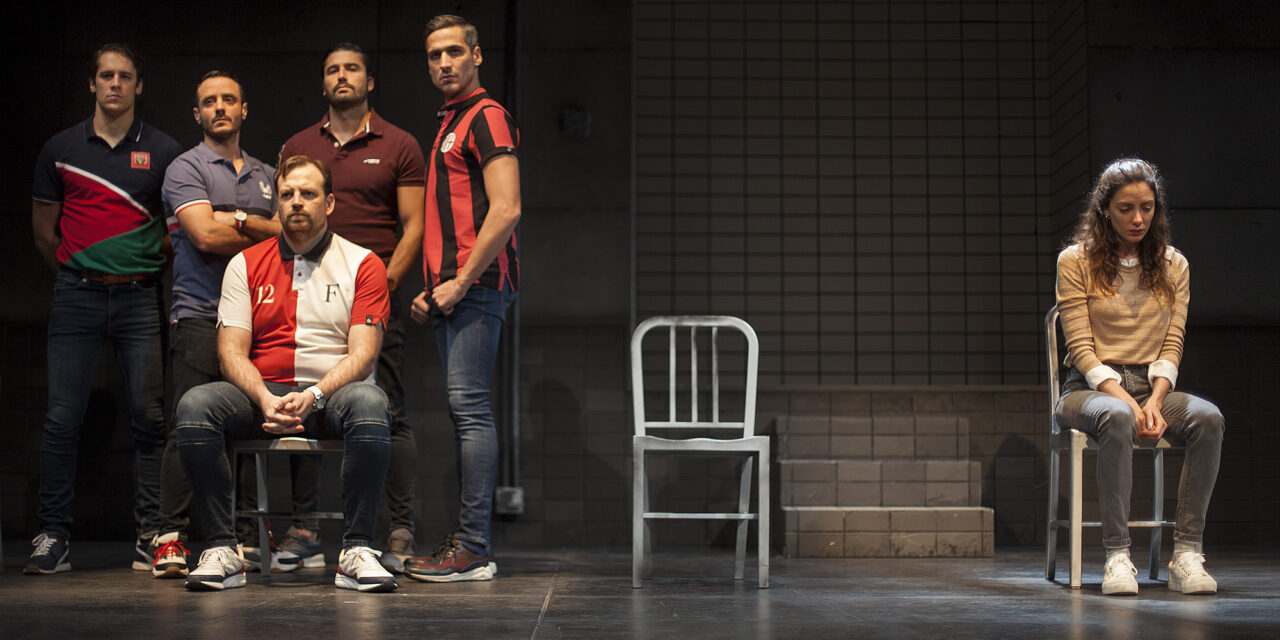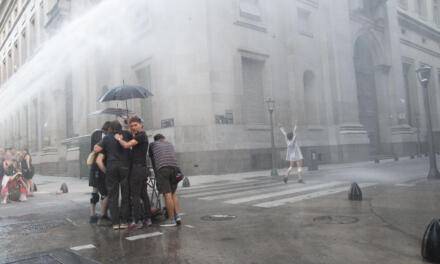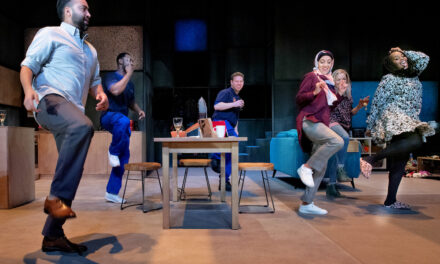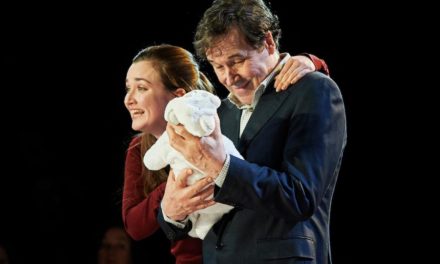At El Pavón Teatro Kamikaze, Jordi Casanovas has crafted a double bill of verbatim plays dealing with uncomfortable legal incidents that have generated difficult legacies. Port Arthur looks at the interrogation of Martin Bryant, who was accused, tried and found guilty of the 1996 mass shooting in Tasmania’s Port Arthur which left 35 dead and 30 wounded. Jauría (English title Pack) hits closer to home with a staging, daringly realized by Miguel del Arco, of la manada (“the wolfpack”) case. On the early morning of 7 July 2016, five friends from Seville visiting Pamplona for the San Fermín celebrations sexually assaulted an 18-year old woman from Madrid in the hallway of a building, with one of the men filming the incident on his phone. The men later stole her phone and left her semi-naked in the foyer of the building. The woman reported the rape that same morning. The five men—who included a serving member of the Civil Guard (Spain’s rural police force) and a soldier in the Spanish Army—contested that the women, who was drunk, had participated in consensual sex. The trial lasted five months, attracted significant media coverage and generated wide protests in Spain’s major cities. The 96-second video of the rape shared by the five men on a whatsapp group called la manada was presented as evidence. The verdict, issued by the Provincial Court in Navarre, found the men, who had penetrated the woman orally, vaginally and anally, guilty of sexual abuse (which carries a lesser sentence than rape because of the supposed absence of violence and intimidation). One of the judges voiced the opinion that the evening’s events had been conducted in “a general atmosphere of fun and merriment.” The nine-year sentence was confirmed following the men’s appeal at Navarre’s High Court on 5 December 2018 with two dissenting judges voicing their judgement that the women had been a victim of coercive sexual aggression which carries a sentence of up to 15 years.
Both the initial sentencing on 26 April 2018 and the December ruling led to mass demonstrations on the streets of Spain’s major cities and a major backlash on social media protesting at the lenient sentence given to the men, the aggressive cross examination of the woman who had filed the complaint, and the limitations of a penal code on sexual violence which appears not to recognise that intimidation may be psychological as well as physical.
Writer Jordi Casanovas’ previous work on verbatim drama includes Ruz-Bárcenas (2014), a taut adaptation of the declarations on alleged corruption made by People’s Party treasurer, Luis Bárcenas before the investigating judge Pablo Ruz, at Spain’s High Court on 15 July 2013. For Pack, the approach is more ambitious. The cross examinations by the defence lawyers and the public prosecutor are interspersed with the testimony of the defendants and the woman who suffered the assault. Imaginative doubling serves to expose the deeply rooted misogyny that governs Spain’s political, social and legal infrastructures. Pack is a play about the problems with Spain’s democracy.
Alessio Meloni’s set presents a bare, grey room with a tiled alcove at the back of the stage. Harsh lights bear down on the empty space. Five men are clustered together. They move in harmony, their clapping hands providing a percussive flamenco rhythm. Together they mask the body of a woman, still standing. They move like the pack of the play’s title, at one moment engaging in supposed revelry and then turning suddenly, screaming at her in a gesture of unadulterated aggression.
From the production’s opening, the dynamics are clear: five friends—Ángel Boza (Ignacio Mateos), Alfonso Jesús Cabezuelo (Raúl Prieto), Jesús Escudero (Álex García), Antonio Guerrero (Martiño Rivas) and José Ángel Prenda (Fran Cantos)—who all stick together. They sport a uniform of sorts: dark jeans and some sort of polo or sports shirt. They are away from their native Seville and determined to have a good time. The conversation is fast and fluid. The men finish each other’s words, they create the background music of the busy bar where they are partying; they laugh and joke; they stand together as one. Their complicity is evident. The men’s moves, evoking something of the goading of a bull, draw a direct analogy between the wild running of the bulls through the streets of the city during the San Fermín festivities and the men’s conduct. The flamenco beat both positions the men within their native Andalusia and offers an ominous soundtrack to the action. Flamenco was deployed by Franco to offer a happy-go-lucky image of the nation to promote tourism and mask the atrocities promoted by the regime.
While the men refer to each other by name, the woman, played by María Hervás, is never named. It may be to accord her a degree of protective anonymity—the original trial was conducted behind closed doors for this very reason—, as well as to frame her as part of a wider movement calling for changes in relation to gender equality in Spain. International Women’s Day (8 March) in 2018, saw over five million women participate in a feminist strike to protest against an endemic culture of machismo that legitimises inequality, domestic violence and a problematic gender pay gap in Spain. Pack is an important contribution to an ongoing debate that has galvanised around Spain’s anachronistic rape laws. “The jurisdiction of the stage begins where the domain of secular law leaves off,” Schiller observed in 1784; it’s a lesson that Del Arco and his creative team have carefully heeded.
Director Miguel del Arco choreographs the male gang’s bodies in configurations that show them as a mighty monolith against Hervás’ waif-like “She.” The assault is carried out with a sense of military precision—two of the group boast positions in the police force and army and put that logistical nous to good use. The metallic chairs are harnessed as weapons to better surround the inebriated young woman. The insistent Ángel begins with soft kisses, as the woman sways unsteadily, but then moves into more aggressive moves. The group cajole her; they isolate her; they make the most of the fact that she is drunk and disorientated; they move her along from a crowded bar into the streets and then into the alcove that doubles as the foyer to the building. (Interestingly, security camera footage in Pamplona, in place for the bull running, allowed the gang to be identified and arrested so swiftly.) Away from the public gaze, they engulf her as she disappears into a mass of male bodies.
When she emerges, it is almost as if they are picking at her like vultures. They grab her, tear at her clothes, pull her by her ponytail and push her from one to the other like a rugby ball. They hold her face and jaw back and Antonio records the abuse with his phone. She is left to fall while the gang lean on each other for support. The contrast couldn’t be any more visible. They run away after stealing her phone, ripping up the sim card; no word of concern, no question as to her welfare. Alone on stage, she moves to a chair stage left as if attempting to distance herself both from the location of the rape and from the men themselves. Her monologue testifies to the shame she feels.
María Hervás delivers a terrific performance, from the slightly uncertain conversations in the cramped bar to freezing in terror with her eyes closed to block out what is happening as the rape unfolds. The images she recalls in court are partial and incomplete. “I could not look at their faces, I only remember seeing their tattoos,” she confesses. Her voice cracks and trembles. There are moments when she places her hands over her face in shame. At others, she remains motionless. There is a resolve to the recounting of the incident: a commitment to make manifest the paralysis, the shock, the fear of calling out for help. She cannot scream out and should not be judged for it. “I just wanted it to end as soon as possible,” she observes.
Del Arco doesn’t opt for a literal, graphic representation of the violence but rather symbolic moments, later referred to during the trial, that embody the excesses of the abuse. Left alone in the centre of the stage, she speaks quietly about the insomnia she has suffered, the therapy she has undertaken. The court takes shape around her. The five male actors put on the robes of the Spanish legal profession and take their places as lawyers acting for the defendants and a presiding judge—the latter, played by Fran Cantos, standing stiffly (almost protectively) in the recess where the abuse took place. The wolfpack (manada) become a different pack (jauría). The lights come up in the auditorium to involve the audience in the trial. It is almost as if a light were shining on all of Spanish society. No-one can remain in the dark. The four lawyers circle the woman like predators, invading her space both physically and psychologically. The questions they pose are hostile and bellicose, intruding into aspects of her life that have no bearing on the case—the evidence is permitted of a private detective hired by Antonio’s family to follow her while on a night out laughing with friends.
The lawyers want to know why she didn’t scream out, why she remained motionless, why she didn’t fight back. They are shown as another aggressive pack who seek to present her as complicit in the events of 7 July and endeavour to undermine her credibility. The language may be more formal, cautious and polite, but it’s clear that their assault is offers a further violation of her privacy and her dignity. Lawyers pull their chairs in to enclose her—their patterns of movement recall those of the wolfpack. They guide her to the place of her violation—revisiting the situation both physically and emotionally as they continue with their inquisitorial line of questioning: “Were you, forgive me for asking, excited?” one asks. They reprimand her for posting photographs on Instagram and seeking to move on with her life. They have a ready supply of tissues to hand out whenever she cries: choreographed gestures of sympathy performed in unison that tellingly display no empathy.
Just as the wolfpack turn into the defence lawyers and judiciary, the violated woman moves into the role of public prosecutor. Here she seeks to control and contain la manada. They leer, boast and answer with a swaggering sense of confidence. They face her without shame or remorse. The men stand proudly at the front of the stage and recite their whatsapp chat messages boasting of gang rape. “Sister, I do believe you,” the woman next to me chanted as the men continued deflecting the public prosecutor’s questions. Almodóvar’s new film Pain and Glory (2019) features the line as a further public commentary on the case of la manada. It is now a hashtag (#HermanaYoSiTeCreo) adopted by millions of women who have protested against the leniency of the aftermath of the verdict, and it can be heard through the interrogation, echoing the sounds of the women who protested outside the courthouse in Pamplona where the trial was being held. Alongside #Cuentalo (#TellIt), it functions as a call to arms, a need to speak out that María Hervás’ dual roles embody.
The toxic masculinity that runs through the play is embodied across different shapes and forms—from the overt physical aggression of the assailants to the smiling coercion of the defence lawyers. “A woman on her knees with four men surrounding her,” is both an image conjured during the physical assault and a phrase used by the public prosecutor to make manifest the deep-rooted inequalities of the encounter with la manada and, perhaps more worryingly, the judicial system. Of the three judges that originally tried the case, one called for the men to be fully acquitted of all charges.
In the play’s final section, five judges revisit the original verdict; two argue with three of their colleagues who allege that the young woman’s conduct does not fit their image of how a “victim” should behave. The faultlines of Spain’s democracy—built on the foundations of Franco’s dictatorship—are powerfully exposed in del Arco’s electrifying production. Cronyism serves as a default mechanism for action. As the verdict is read out, the judges shed their robes and the gang pulls together once more. Only one of la manada shows a shred of remorse; the default group position is bemusement that they are being tried for what they believe is “normal” behaviour. Four of the gang have subsequently faced trial for a second attack, filmed by Prenda on Guerrero’s phone, for assaulting a woman asleep in a car in Andalusia.
The production comes as the case awaits a hearing at Spain’s Supreme Court. In the aftermath of public disgust that greeted the confirmed verdict, the decision to initially appoint a group of 20 male legal experts to look at a possible reform of Spain’s laws on sexual assault points to the challenges involved in dismantling male privilege. Copycat rapes have followed—a group in Gran Canaria, calling themselves la nueva manada (the new wolfpack) raped an underage girl and filmed the incident on their phone in June 2018—and la manada remain on bail pending the appeal hearing in Madrid. This is a production where outside events leak into the theatre on a daily basis. The cast perform with commitment; the performances are uniformly excellent; Sandra Vicente–Studio 340’s sound design is suitably disconcerting; Juan Gómez Cornejo’s lighting creates pockets of action within the stage and brutally exposes the excesses committed onstage that spill out into the public space of the auditorium. The men’s behaviour unsettles in its unquestioning certainty to the bitter end. At the end of Pack, María Hervás’ unnamed woman remains on stage and looks out in a gesture of defiance and hope: “I’m twenty years old. There’s a lot to come.” Here’s hoping that the tide of activism that la manada has case has generated continues to generate a step change in relation to gender politics in Spain.
Jauría (Pack) plays at El Pavón Teatro Kamikaze until April 21.
*Note: This theatre is also playing another show that may be of interest. You can read the review “Port Arthur:” Uncomfortable Verbatim Theatre by Maria Delgado.
This post was written by the author in their personal capacity.The opinions expressed in this article are the author’s own and do not reflect the view of The Theatre Times, their staff or collaborators.
This post was written by Maria Delgado.
The views expressed here belong to the author and do not necessarily reflect our views and opinions.


















